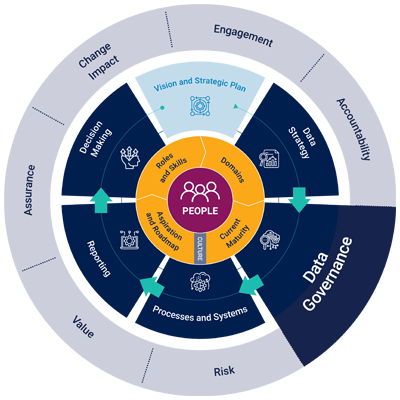Data journey: data governance
The data maturity framework shows how effective data governance ensures that data is accurate, timely and complete.
Who owns data governance?

The vice chancellor or college chief executive/principal is accountable for data governance.
Data governance is the responsibility of all staff members but oversight and overall responsibility for data governance is likely to be delegated to one of the following roles:
- chief information officer (where in place)
- registrar
- head of ICT
- head of management information systems
Data governance initiatives may involve a matrix of defined responsibilities (such as information asset owners and managers) with specific tasks. The assurance of this framework may be managed by:
- information manager
- data governance lead/officer
- data analyst (where institutions do not have specialist data governance roles)
- head of management information systems
Data governance is likely to be highly collaborative within and between organisational units and a delegated committee may provide accountability though it must have a clearly defined remit.
The role of data governance
Institutions and colleges need data that is accurate, timely and complete. Data governance is the accountability, decision-making and assurance that ensures this happens through effective policies, standards and actions. For example:
- Teams understand that the information entered or amended on corporate systems is data and is an asset. Good data governance helps teams do this well, through effective processes, systems and monitoring.
- Managers understand the flow of data through the institution or college. The impact of new system implementations or organisational structure changes is known and managed. Good data governance promotes an understanding of the impact on data from business decisions.
Embedding good practices using a framework or defining individual roles can provide a structure for initiatives but there can be a risk that process is mistaken for progress. Ultimately, the protection of data assets falls to individual colleagues, teams and managers who should be supported to meet this responsibility.
Data governance and data maturity
Mature institutions and colleges are likely to have policies in place which enable pre-emptive activities. These may include training and support mechanisms to ensure teams accurately input and amend information in a timely fashion.
Where organisations are less mature, processes may be reactive, for example, focusing on data quality issues which are fixed retrospectively. These activities should be used to monitor the effectiveness of data governance initiatives but are not a replacement for the development of a culture of accountability for data.
Data governance themes
We have divided data governance into the following six thematic areas.
Accountability
The clarity on individual, team and functional responsibilities in relation to data assets.
Assurance
The mechanisms to monitor the effectiveness of data governance activities.
Change impact
The impact on data assets of predicted and unpredicted change activity.
Engagement
The effective management of relationships with stakeholders and approach to the barriers to effective data governance.
Risk
The appetite for and approach to the management of risk in relation to data assets.
Value
The understanding of the value that can be gained from data assets and how that can be realised.
Processes and systems
Systems generate and hold institutional and college data, based on agreed processes. This data is directly used to create live, near live and trend reporting.
The data maturity framework is copyright Jisc and made available under CC BY-NC-ND. Find out more about using content from the data maturity framework.